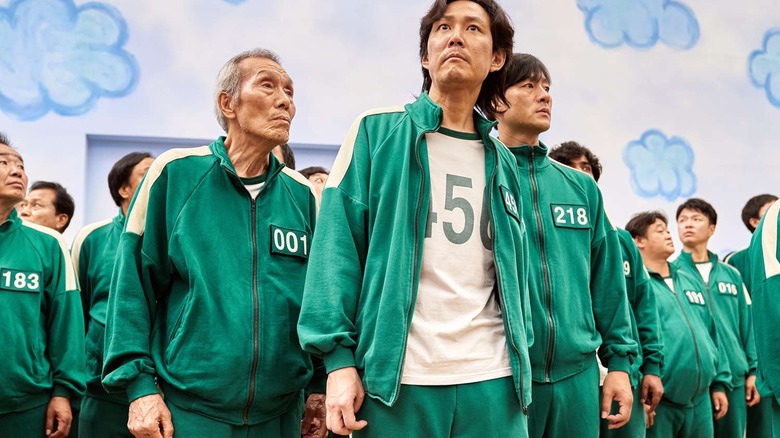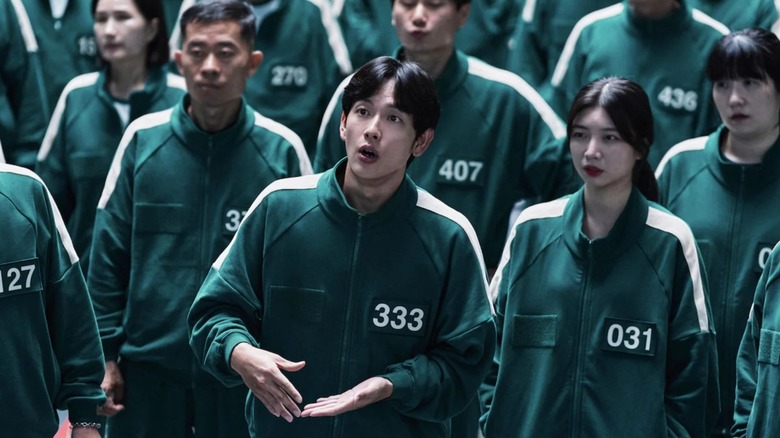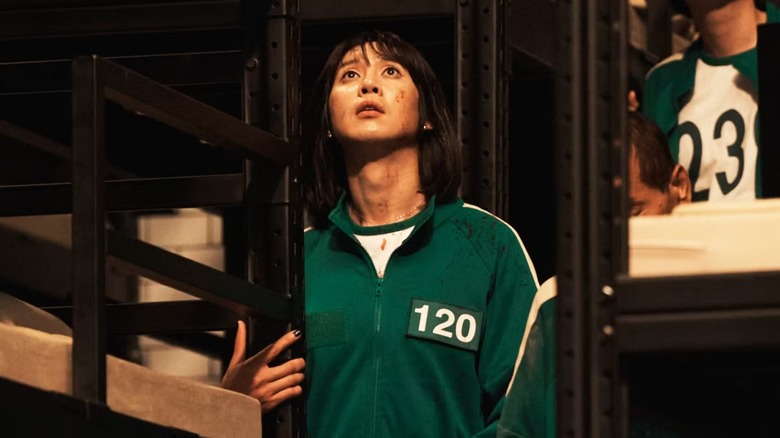
Netflix’s “Squid Game” became a global smash hit in 2021, and managed to retain that status almost three years later with the recent release of season 2 (which ends on an insanely frustrating cliffhanger). Anticipation for a third and final season of the South Korean survival thriller is currently at an all-time high, as the fates of its characters — both fresh and returning faces — remain up in the air. The true culprits behind the titular games are still a subject of mystery for Seong Gi-hun/ Player 456 (Lee Jung-jae), who is seen entering the dehumanizing death match yet again in the show’s second season, as he wishes to shut the games down for good. The latest iteration of the games seems bloodier than ever, exposing heinous human tendencies when faced with a survival scenario designed to embolden the worst in us.
While the explosive popularity of “Squid Game” can be traced back to series creator/director Hwang Dong-hyuk’s taut, compelling vision and the spirited performances that ground it, social media trends undoubtedly played an integral role in helping the show gain traction. TikTok trends circling the series have partially helped cement it in the pop-culture zeitgeist, be it in the form of viral fancams, theory-crafting in bite-sized formats, or hyper-specific memes. Season 2 is no exception to this sustained virality, as you must have come across the recent “Mingle Dance” trend on Tiktok, referencing a particular challenge from the new season. You also might have stumbled across thousands of fancams featuring actor Lee Byung-hun, whose turn as The Front Man has left audiences curious about his other cinematic contributions over the years.
Unfortunately, this obsessive scrutiny can be a double-edged sword. Days after season 2 of the show premiered, a now-viral TikTok video claimed that a “real-life” Squid Game took place in 1986, in “a bunker underground in no man’s land, where people were held and had to complete several games to survive” (via The Korea Times). This claim was furnished alongside images of what seemed to be a run-down warehouse with vibrant walls and staircases, similar to the grand, maze-like lobby in the series. The pictures also featured groups of people, presented as unwilling participants of these purportedly inhumane death games. This video has been shared over 17,000 times, and currently sports over 50,000 likes.
This claim, and some of the pictures shared along with it, have been proven to be indisputably false.
No, Squid Game has no connection to the heartbreakingly horrific Brothers Home crimes
The photos used in the viral TikTok were of real inmates from Brothers Home, an internment camp in Busan that was active during the 1970s and ’80s. These real, harrowing pictures were blended with AI-generated components of a warehouse with pink and green walls to deliberately draw a connection to the Netflix series. The false insinuation that “Squid Game” is a dramatic reimagination of the real-life atrocities that took place in Brothers’ Home can be traced back to similar internet rumors surrounding season 1, cemented via media articles that echoed these baseless claims around that time. Needless to say, it is a shame that the bone-chilling reality of Brothers Home has been connected to a fictional show to manufacture shock value, with discernment or empathy removed from the equation.
The horrors of Brothers Home warrant lengthy and nuanced discussions, but here are some barebones facts about the Korean internment camp masquerading as a social welfare facility. South Korea in the 1970s and ’80s underwent efforts for grass-roots level reforms, as preparations for the Seoul Olympics loomed large, prompting a nationwide overhaul. This period was preceded by the sustained aftereffects of the Korean War, which forced the government to turn its attention toward the most affected demographics. However, instead of rehabilitating the most vulnerable social groups, the government opted to “cleanse” any symbols of “disorder” to bolster its natural reputation before the Olympics. The Social Welfare Services Act of 1970 legitimized the arrest and detention of anyone the authorities deemed as a “vagrant,” including orphaned/unattended children and folks with disabilities.
Investigations into Brothers Home, which was a welfare center on paper, revealed that the inmates were subjected to forced labor, sexual violence, and horrific psychological torture. Testimonies that emerged post-investigation revealed that chemical drugs were often force-fed before abuse, and contemporary reports have tallied a total of 657 deaths inside Brothers Home. Nobody has been legally held accountable for these deaths and the alleged human rights violations that took place inside the facility, to this day.
What Netflix’s Squid Game is actually based on
The primary themes that run through “Squid Game” might be pretty heavy-handed, but any fictional premise that staunchly critiques capitalism and its fallout (while focusing on what makes us human), is, in my book, more than welcome. Hwang Dong-hyuk juxtaposes the hellish deathmatches with the borderline unlivable real world, where people are weighed down by massive debts and desperate efforts to make ends meet. Although the ethos surrounding the Squid Games is undoubtedly dehumanizing and hypocritical, these moral voids are easy to bypass for those with their backs against the wall, who are ready to pay any price for a dazzling piggy bank containing 45.6 billion won.
In a 2021 interview with The Guardian, Dong-hyuk explained that the idea for “Squid Game” resulted from his financial situation in 2009, in the aftermath of the global financial crisis that hit him and his family pretty hard:
“I was very financially straitened because my mother retired from the company she was working for. There was a film I was working on but we failed to get finance. So I couldn’t work for about a year. We had to take out loans – my mother, myself, and my grandmother […] I read ‘Battle Royal’ and ‘Liar Game’ and other survival game comics. I related to the people in them, who were desperate for money and success. That was a low point in my life. If there was a survival game like these in reality, I wondered, would I join it to make money for my family? I realized that, since I was a filmmaker, I could put my own touch to these kinds of stories so I started on the script.”
Regarding the series’ title, the director stated that he used to play “squid game” as a child, which is a version of tag that relies on physical strength for the winner to make their way to the squid’s head drawn on the ground. “I used to be good at fighting my way to the squid’s head. You had to fight to win,” Dong-hyuk said, laying out his inspiration for portraying the thematic layers behind Gi-hun’s pyrrhic victory and eventual return.




Leave a Reply